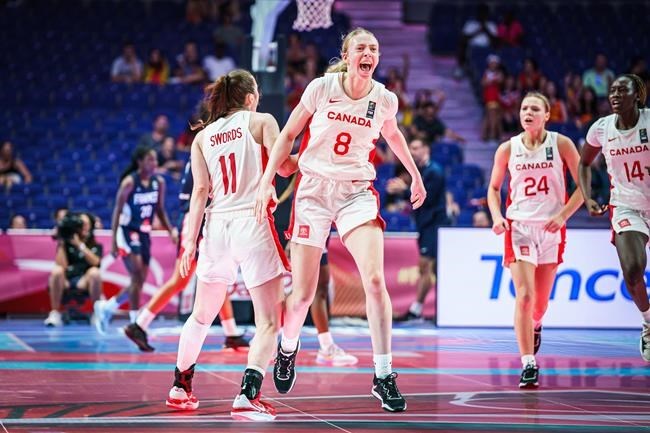The Canadian women's basketball program has a bright future, as evidenced by its latest showing at the under-19 level.
Canada won its second-ever medal at the FIBA U19 Women's Basketball World Cup with an 80-73 overtime victory over France in the bronze-medal game Sunday. Canada's only other medal at the tournament came in 2017, also under head coach Carly Clarke.
"This is our second medal at the U19 worlds in the past six years. I think there's a goal for Canada to be on the podium at every major event," Clarke said. "That's a big goal but that's what I think our talent level allows us to push towards and think about and plan for.
"(To) figure out the way that we can consistently be in a semifinal game, win the semifinal game and challenge not just for a medal but a gold medal."
Clarke's 12-player squad — which dropped one of its seven games in a tight semifinal to eventual silver medallist Spain — consisted of players that have committed to an NCAA Division I school, or are entering their sophomore year at one.
"That's the level of player that's developing now in Canada," Clarke said. "The top programs in the NCAA, the WNBA — pro leagues are interested in our Canadian players because they have athleticism, the skill set, the passion and competitiveness and desire to get better.
"A lot of people came to our team with some great experiences this summer and the depth of our team was certainly one of our greatest strengths. One through 12, we were a very, very, very strong team."
Canada was led by forwards Toby Fournier and Cassandre Prosper and guard Syla Swords, who each finished in the top 15 in scoring, all at the 15-plus point per game mark.
Fournier, a 17-year-old Toronto native who committed to Duke University as a five-star 2024 recruit, averaged 16.1 points, a tournament-leading 13.7 rebounds and 2.1 blocks per game. The six-foot-two Fournier earned All-Star Five honours for her efforts.
"Her impact at both ends of the floor is really, really high and she just has an athleticism that is truly world class," Clarke said. "She got better every single game and learned, I think about herself and how to best use her skills at the world level.
"What really stood out to me about her is her competitiveness. She competes incredibly hard, doesn't allow herself to fatigue and really pushes through some tough moments."
Prosper, who was a five-star recruit in the 2023 class and played as an early enrollee last season for 11th-ranked Notre Dame, led Canada in points per game (16.2), along with averages of 5.8 rebounds, 1.8 steals and 1.8 blocks in six appearances.
Swords averaged 15 points in seven games while shooting 46.2 per cent from three-point range. The Sudbury, Ont., native — another five-star 2024 recruit that's committed to Michigan — earned all-second team tournament honours.
Swords saved her best performance for last with 26 points, six rebounds and six assists in the bronze-medal win.
Prosper, a native of Montreal, and Swords both carried senior team experience with them, having also won bronze at the FIBA Women's AmeriCup in Mexico earlier in July.
"Joined us two days before the World Cup, as (they) came from AmeriCup with the senior team," Clarke said. "Huge credit to both of them in their ability to integrate with our team quickly.
"I really think that speaks to their character as people. To train for 10 days and then add two new people for the tournament is a challenging dynamic but they both nailed it and our team nailed it."
The relationships the players formed from competing with, or against, one another in different contexts proved to be a big factor in the team's success, Clarke said.
"We were able to have a training camp in April that built the foundation for what we wanted our team to be this summer," she said. "The familiarity, certainly on the floor, but I think even beyond that, there's really strong relationships among all these players off the floor.
"They care about each other, they want each other to succeed, they really enjoy being around each other every day and I think that chemistry on and off the floor really built a united, connected team that allowed us to find our way to the podium."
This report by The Canadian Press was first published July 28, 2023.
Abdulhamid Ibrahim, The Canadian Press


